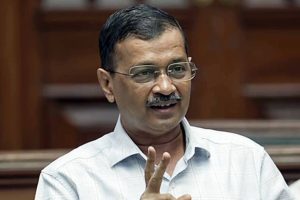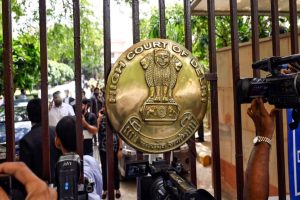The Delhi High Court on Monday issued notice to the Enforcement Directorate (ED) on a regular bail plea moved by Aam Aadmi Party’s senior leader Sanjay Singh in a money laundering case related to an alleged Delhi excise policy scam case.
Sanjay Singh was arrested by the Enforcement Directorate in the case on October 4, 2023.
The bench of Justice Swarna Kanta Sharma while seeking a response from ED, fixed January 29, 2023, for the next date of hearing.
Sanjay Singh through plea stated that he is neither an accused nor a suspect in a scheduled/predicate offence (CBI Offence), wherein, the investigation has been continuing since 17.8.2022 and despite 3 Charge-Sheets/ Supplementary Charge-Sheets having been filed, absolutely nothing has surfaced against him till date.
Bail Plea further stated that at the outset, the Applicant states that the Applicant is not guilty of any criminal wrongdoing or any violation of the provisions of the PMLA in any manner whatsoever and therefore, the Applicant’s life and liberty must be protected from unwarranted and unjustified encroachment at the hands of the DoE based on a false, malicious and motivated case without any merit.
On December 22, 2023, the trial court dismissed his bail and said, “The Court is of prima facie view that the case against him is genuine. Evidence shows his involvement in the alleged offence of money laundering. There are reasonable grounds for believing that he is guilty of the alleged offence of money laundering.”
Special Judge MK Nagpal expressed his prima facie view and said, “The evidence and material show involvement of the applicant in the commission of the alleged offence of money laundering because he is shown to have been, directly or indirectly, involved in the process or activities connected with proceeds of crime generated through the scheduled offences case of CBI.”
The court further said, ” The evidence and material are also sufficient to furnish this court reasonable grounds for believing that he is ‘guilty’ of the said offence in terms of provisions contained Under section 45 of the PMLA. It can be said that the conditions laid down by section 45 for the grant of bail are not satisfied.
While dismissing the bail application, the court had also said that it had approved by the Supreme Court that bribes in connection with the formulation of the Delhi excise policy were paid.
“It can also be observed by this court that the basic case of ED in the present ECIR stands approved upto the Supreme Court and it has been endorsed by the Apex Court that the bribe or kickbacks in connection with formulation of excise policy of the GNCTD for the year 2020 21 was/were paid and it was so approved by rejection of bail application of accused Manish Sisodia on merits by their Lordships of the said court,” special judge MK Nagpal said in the order.
The court had also said that even the bail applications of various other accused arrested in this case, namely Sameer Mahandru, Amit Arora, Vijay Nair, Arun Ramachandran Pillai, Amandeep Dhall and Abhishek Boinpally, have already been dismissed by this court in light of their involvement with the process and different activities relating to the said proceeds of crime and bail applications of some of these accused are now stated to be pending before the Supreme Court or before the High Court.
Thus, the observations made by this court regarding the interpretation of provisions of Section 45 and 50 of the PMLA, while dismissing the said bail application based on the legal position stated above, have yet not been overturned or set aside either by the High Court or by the Supreme Court, Special judge clarified in the order.
The special judge also noted that reliance was placed on the above order of the Supreme Court granting bail to the accused Benoy Babu in this case.
The court said that even in the said order of the Honorable Apex Court no contrary observations regarding the interpretation of the said provisions are found to have been made and even no parity can be drawn therefrom qua the applicant as the said accused was in custody in this case for the last around 13 months and his case on merits is also stated to have been different.
It was submitted by the Counsel for Sanjay Singh that no recovery of any part or portion of the amount of Rs. 2 crores allegedly paid to the applicant has been effected from his possession or even from his residence during such proceedings dated 04.10.2023. The court said that this is not material as such recovery is not always necessary to be effected.
It was also the submission of Senior Counsel that besides the above oral and documentary evidence, there is no other documentary evidence to show the trail connecting the applicant with the alleged proceeds of crime.
The court rejected the submission and said that even this submission of Senior Counsel cannot be given any weight at this stage as no such further documentary evidence constituting the trail thereof could have been possible to be collected or recovered by the investigating agencies since the alleged transactions constituting the generation of proceeds of crime were made in cash only and not through any documentary or electronic mode.
The court also rejected the submission of Senior Counsel for the applicant that the statements of the approver should not be considered as the same has been given by him under an inducement from or the influence of ED officials and on a promise of being tendered a pardon in case he gives an incriminating statement against some big politicians of AAP including the applicant.
The court said that even these submissions of Senior Counsel cannot be accepted at this stage. There is nothing to show from the record that the approver had acted under any coercion or influence of the ED officials.
The court also said that besides the evidence and material collected by ED in respect to delivery and payment of an amount of Rs 2 crores to the applicant by the approver Dinesh Arora, it has also been alleged that the applicant is even found to have played an important role towards the formulation of the excise policy of the GNCTD for the year 202021, i.e. previous to the year 2021- 22 in respect to which these cases were originally registered, and it is being stated that during the investigation, recovery of one unsigned MoU of 18.06.2020 has been effected.
The said MoU was to be executed between accused Amit Arora, approver Dinesh Arora and one Vivek Tyagi and it is alleged that through this MoU and some other related activities, an attempt was made by the applicant to generate proceeds of crime to offences committed in respect to the above said previous policy, the court noted.
It was stated that Vivek Tyagi was attempted to be inducted as a dummy partner by the applicant in the above firm named Aralias Hospitality belonging to the accused Amit Arora and a share of twenty per cent was sought to be secured for this dummy associate of the applicant.
The court observed, “It was done in lieu of extending favours to the accused Amit Arora in connection with formulation and implementation of the said policy for the previous year 2020-21, though, somehow, the said attempt could not succeed.
The statements of approver Dinesh Arora accused Amit Arora and witness Ankit Gupta, who was working as CA of approver Dinesh Arora, are being referred to this aspect along with statements of some other witnesses.
The court further said that it is also gathered from the above statements that though initially the above entity was sought to be created with only two partners, namely the approver Dinesh Arora and accused Amit Arora, the name of Vivek Tyagi was added later on and the statements of approver and the above other accused further show that it was done at the instance of this applicant only.
It is alleged by the agency that Vivek Tyagi is the current Personal Assistant of the applicant, the court noted in the order.




